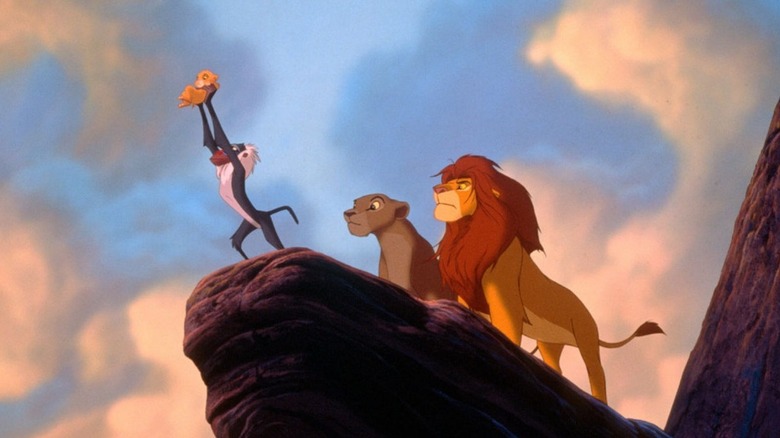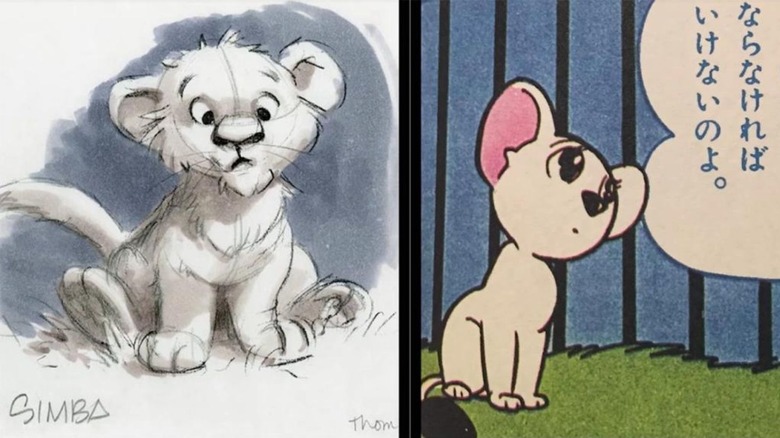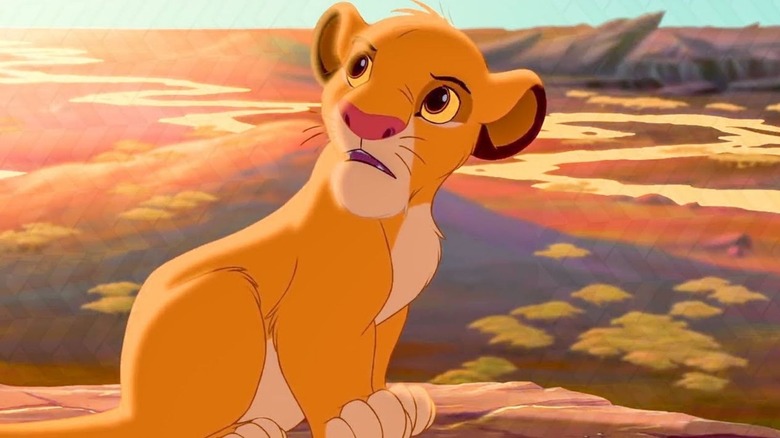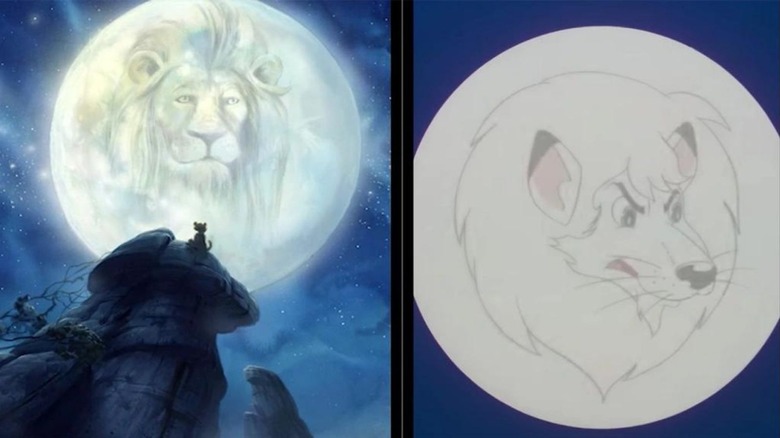Why Some Thought The Lion King Was Just A Copycat Of This Anime
It doesn't come as a surprise to anyone that "The Lion King," Disney's Africa-set family classic, is one of the most loved animated films of all time. It's one of Disney's highest-grossing films, and the company's first to have not been a retelling of a classic tale (such as "Cinderella" or "Beauty and the Beast"). It was presented as "the studio's first original story," but shortly after "The Lion King" was released, the film couldn't keep up with the label it had been presented with.
When the film was released on Japanese soil, a lot of people were surprised by its resemblance to a Japanese-created American television anime series called "Kimba the White Lion," which also told a story of a lion cub set against the rich tapestry of African wildlife. The anime began airing in the United States in 1965 and was based on a 1950 Manga series from Japanese animator Osamu Tezuka, called "Jungle Emperor Leo."
Osamu Tezuka, the man behind "Kimba the White Lion," was referred to as the Japanese equivalent of Walt Disney, who served as a major inspiration to him during his formative years. Tezuka's artistic genius led him to create over 700 manga titles — 150,000 pages of hand-drawn art and over 60 anime shows in his lifetime, a feat that made him one of Japan's most prolific manga creators of all time. When "The Lion King" was released, the film opened to a delighted audience and massive critical acclaim. Still, those familiar with Tezuka's work were immediately drawn to its similarities with "Kimba the White Lion" in both animation and story.
The Lion King and Kimba the White Lion share many near-identical elements
The anime and the movie share some major elements — while they're both coming-of-age stories that depict the journey of an African lion cub, they also share the same tragic storyline where their fathers are murdered, and the sons must grow up and rise as leaders in their place. "The Lion King" only revolved around the animals, but Kimba's story included human characters in addition to animals, centering on the conflict between nature and civilization. It also doesn't help that Kimba and Simba are essentially the same names, with the difference being a single alphabet.
And that's not all. Call it a mere coincidence and nothing more, but "The Lion King" and "Kimba the White Lion" have more in common than you may have thought. In both films, the primary antagonist is an evil lion with a black mane and a scar. While Scar in "The Lion King" has a scar over his left eye, Claw from "Kimba the White Lion" has a scar in place of his left eye. Claw and Scar both have sidekicks that are cackling, spotted hyenas — while the former has two, the latter has three. Simba and Kimba's circle of advisors also share similarities — they're comically hysterical birds; a hornbill and a parrot, respectively.
There are also early pieces of concept art for Simba that witness him being drawn as a white lion — and critics believe the most substantial evidence of Disney being inspired by Kimba are the scenes that mirrored "Kimba the White Lion." Death scenes for Simba and Kimba's fathers are eerily similar, and there are shots of African plains and animals moving across them. Remember the iconic visual with the lions atop Pride Rock? The same can be found in "Kimba the White Lion" too. And concept art for "The Lion King," where Mufasa appears to Simba as an image in the moon, was first created in an episode of "Kimba the White Lion."
How Disney handled the controversy
The accusations of "The Lion King" stealing from Tezuka's anime have plagued the film since its release. "The Simpsons" also joked about it during an episode, mistaking Kimba's name for Simba. And "The Lion King" co-director Rob Minkoff vehemently denied having discussed or referenced Tezuka's work while working on the film, during an interview with the Times (via The Hollywood Reporter).
He said, "I know for a fact that [Kimba] has never been discussed as long as I've been on the project."
The next day, screenwriter Linda Woolverton told the San Francisco Chronicle, "This is the first I've heard of Kimba or Tezuka. I never heard anything or saw anything about his work."
Disney spokesman Howard Green agreed, adding: "None of the principals involved in creating 'The Lion King' were aware of Kimba or Tezuka." He later changed his stance, deciding that "some" team members had heard of Kimba, while an anonymous source confessed that they had discussed the anime series during meetings. Disney, however, continued to maintain that Tezuka's work had not influenced the film in any way.
Then came Matthew Broderick. The actor behind the voice of adult Simba revealed he initially thought he was being hired for a project associated with Tezuka's anime.
Broderick had reason to believe he was working on a remake or a new project directly associated with the anime. In an interview with the Austin American Statesman (via The Hollywood Reporter), the actor noted: "I thought [they] meant Kimba, who was a white lion on TV when I was a little kid. So I kept telling everyone I was going to play Kimba."
An open letter to Disney
Disney has since maintained that "The Lion King" is inspired by Shakespeare's "Hamlet" alone. The company's consistent refusal to acknowledge that the film borrows from Kimba's story prompted Japanese animator Machiko Satonaka to write an open letter to the studio, which was accompanied by a petition, describing Tezuka's work as a "national legacy" and requesting Disney to honor his work by crediting Kimba at the beginning of "The Lion King." Over 80 Japanese cartoonists and animators signed the petition — which didn't have the desired effect, and instead put an end to the controversy.
Despite the open letter, the company behind "Kimba the White Lion" never retaliated with legal action against Disney — which was already an animation titan at the time. Fans have suggested that the reason behind their silence could be because Disney had already paid them off in secret, or that the Japanese people's love for Disney encouraged them to stray away from causing any legal woes. Takayuki Matsutani, the president of Tezuka Productions, later noted in the San Francisco Chronicle that if Disney had indeed "taken hints" from Kimba, the late Osamu Tezuka would be "very pleased" by it.
Considering the immense influence "Kimba the White Lion" had on decades of animation, it's sad to see it reduced to nothing when Disney has evidently referenced it in the film. It's a shame that new audiences continue to be introduced to "The Lion King," without ever realizing that Kimba's story exists too.



